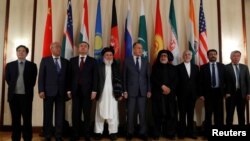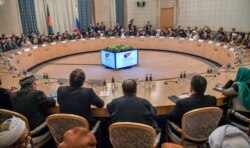Russia, China and Pakistan have called for an early resumption of negotiations between the United States and the Taliban to reach an agreement about ending the war in Afghanistan.
President Donald Trump in early September abruptly halted the yearlong dialogue with the Taliban after a series of deadly insurgent attacks in the Afghan capital, Kabul, resulted in the death of an American soldier, among others.
On Friday, Moscow hosted U.S. chief negotiator Zalmay Khalilzad, along with Chinese and Pakistani representatives to review their joint efforts to reach sustainable settlement in the war-hit country by political and diplomatic means.
“Russia, China and Pakistan expressed their support for the earliest resumption of negotiation process and reaching an agreement between the United States of America and the Taliban movement, which will pave the way for launching intra-Afghan talks,” a post-meeting statement noted.
It said that participants stated their expectations that all sides will observe a cease-fire for the duration of intra-Afghan negotiations, calling on the Afghan government and the Taliban to release “significant numbers of prisoners at the start of intra-Afghan negotiations.”
Muhemmed Aejaz, head of the Pakistani delegation, tweeted after the meeting that participants “are hopeful about and agreed to expedite the earliest peaceful resolution of the issue through an Afghan-owned and Afghan-led peace process.”
Russia initiated the dialogue process this year and also has hosted intra-Afghan meetings in recent months to help end the war because it believes continued instability is encouraging terrorist groups like Islamic State to establish strongholds on Afghan soil to threaten Central Asian allies.
The delegates from the four countries held their last meeting in Beijing in July when the U.S.-Taliban talks had reached an advanced stage, and the two adversaries in the 18-year-old Afghan war believed they had come close to concluding a peace deal.
Taliban officials say the understanding would have set the stage for U.S. and other foreign troops to withdraw from the country in return for assurances the insurgent group would prevent Afghan soil from again becoming a terror sanctuary and engage in intra-Afghan peace negotiations to permanently end the hostilities.
Intra-Afghan meeting
China, meanwhile, is also preparing to host Qatar-based Taliban negotiators and representatives from Afghanistan, including Kabul government officials, for a two-day intra-Afghan conference scheduled for October 28.
Participants at Friday’s Moscow meeting welcomed the Chinese initiative to host the meeting.
The Taliban said in a statement that Beijing has invited them to the conference and its delegation will participate under the leadership of its Qatar office chief, Mullah Abdul Ghani Baradar.
“All attendees shall participate in individual capacity and present personal views about finding a resolution to the Afghan issue,” the statement noted, underscoring the Taliban's longstanding stance it would not engage in any talks with the Afghan government for being a U.S. puppet.
Afghan officials say they are in contact with Chinese counterparts on the upcoming intra-Afghan conference and will decide about attending provided it is in line with Kabul’s requirements.
The Chinese foreign ministry spokesperson Hua Chunying, when asked to comment on the upcoming meeting, told reporters earlier this week that the information “if we have it, will be released in due course.”
She reiterated China’s support for a “broad and inclusive peace and reconciliation” process in Afghanistan.
“We support the intra-Afghan dialogue between the Afghan government, the Afghan Taliban and other parties. We are ready to offer convenience and assistance for Afghanistan's peace and reconciliation process based on our respect for the will of all relevant Afghan parties,” the Chinese spokesperson noted.
China has maintained close contacts with the Taliban and has been actively urging Afghan warring factions to work for a peaceful settlement to the war, fearing continued hostilities could undermine stability in the western Xinjiang region, which shares a short border with Afghanistan.
For its part, Pakistan also is actively promoting a political settlement to the Afghan war and has played a key role in helping Washington initiated the now defunct peace talks with the Taliban.
Islamabad maintains that decades of Afghan hostilities have undermined Pakistan's security and inflicted billions of dollars of losses on its economy because the two countries share a largely porous 2,600-kilometer border.





